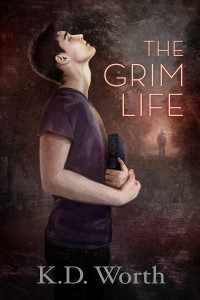***This blog first appeared http://rainbowromancewriters.com/node/1309 while I was blogging as my YA alter-ego, K.D. Worth***
Which came first the chicken or the egg?
It’s a question as old as time.
But why am I talking about it today?
One of the keys to good writing is the ability to evoke an emotional response from your reader. Do you want them to cry? Laugh? Get turned on? Be angry and indignant? Whatever the goal of your scene, you want the readers to feel it as if it’s really happening to them or right before their eyes. I strive to create vivid characters that are so real they come to life, even off the page. Nothing makes me happier than when my beta readers, my editors, or my fans tell me they laughed at a scene or if I made them cry.
Is that mean to be happy when you made someone cry? **shrugs**
Maybe.
But what some may not realize is that we writers get taken on this same emotional rollercoaster as we write. I laugh and I cry when I write those scenes too.
How can I expect my reader to be affected if I am not?
In fact, some of those scenes and the intensity of a book can linger with me for days. Currently, I’m finishing the third book in my Grim Life Trilogy which is the story of a suicidal teenager and the grim reaper who saves his life. The whole series deals with death, depression, anxiety, and learning to love yourself.
 That’s some pretty heavy stuff.
That’s some pretty heavy stuff.
And when I’m writing sad/intense things, I tend to become introverted and melancholy. When you’re so immersed in your fictional world, it’s not always easy to just leave it behind and be expected to converse with the living again. You can’t just shut it off and pretend you didn’t just kill off a character you loved. The people at the EDJ don’t understand this, so they think I’m just being the moody or PMS-ing.
Ugh, the misconceptions of the non-writers.
Like when they ask me “Are you okay?” do they honestly expect me to tell them, “No, I just learned that my imaginary friend was violently raped by his uncle, and it’s really bumming me out.”
Not! LOL
I have been known to tell the hubby, “My hero is burying his old dog today” or “My favorite character is getting killed today, so I’ll need some cheering up when you get home.”
Then he asks, “If it’s making you depressed, why are you writing it?”
“Because I must,” isn’t really the answer he’s looking for any more than the nosey people at work really want to hear about all the mean things I’m putting my imaginary friends through.
As I’m sure all of us have, I’ve used my writing as a creative outlet to work through problems/issues in life. Writing can be the best catharsis for anxiety and stress. I don’t suffer from real depression and to casually toss the term around is unfair to those who truly do have that wretched disease—yet when I’m writing depressed characters their depression does affect me. I had a conversation with a friend recently and laughingly told him, “Everyone in my books is so sad and angsty lately. I don’t know what’s wrong with me.” Then he asked me, “Are you sad about something or is the book just make you that way?”
That’s what got me thinking about the chicken or the egg scenario.
Which came first?
Am I writing sad and morose characters because I have some sort of deep unresolved sadness within me? Is it simply a fascination with the depressing, macabre things in the world? Or are my characters actually controlling my emotions? Which brings me back to the fact that I created them, so, therefore, I must be affecting myself, right?
We writers are very attached to our characters. They’re real to us. For example, I’m working on three different novels right now and plotting a few more in my head. The same friend asked me if having so many projects going on at once ever got confusing. I said, “No more confusing than having conversations with different friends because to me all of these people are real.”
And because these characters are real to me, when they suffer it feels like my real friends are suffering. Granted, these friends live inside my computer and my head, and I’m the one causing them all this pain and suffering, but I still feel it. That makes me a grand puppet master of their misery and my own, right?
So there’s the quandary for the day. Which came first, the sad writer or the sad character? Both, neither, a little of each? Either way, it can be hard to shut off that well of emotions our characters have tapped into, regardless of their origins. And just like the chicken or egg, maybe there truly is no answer. In the end, all you can hope for is a good book.
Well, I hope it’s good anyways!
What about you guys? Is it difficult for you to come out of your imaginary world and immerse yourself back into the “real” world when you’re writing? Do your characters dictate your moods at all? I’d love to hear from you!
~K.D.
K.D. Worth has always considered herself to have the heart of a teenager with an old soul. When not talking to the characters living in her head, she loves to hang out at her favorite townie bar, then go dancing and partying with her husband and friends. On the flip side, K.D. enjoys spending time in her vegetable garden, canning the food she grows, and making homemade jams and jellies. These two different sides to her personality create a layered tapestry of life experience that brings depth and believability to the characters she writes.
